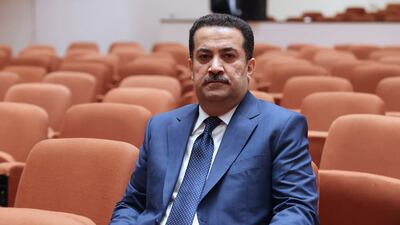Iraq's parliament will convene on Thursday to vote on a new government more than a year after the country held national elections.
The date was set following a request made by the prime minister-designate, Mohammed Shia Al Sudani, to the legislative body on Tuesday.
Earlier this month, parliament elected the country’s new president, Abdul-Latif Rashid, who immediately handed the task of forming the next government to long-time politician Mr Al Sudani.
The move ended more than a year of political stalemate after elections on October 10, 2021, the fifth parliamentary vote for a full-term government since the 2003 US-led invasion that toppled Saddam Hussein.
The political deadlock led to clashes between Shiite militias inside the Green Zone, the location of the parliament, key government offices, residences of senior politicians and foreign embassies.
In his request on Tuesday, Mr Al Sudani presented his government agenda to parliament, saying he will send the list of his proposed Cabinet members later.
But the legislative body turned down the request, saying a special committee has to study the government agenda first and prepare a report before the vote and that the only party to determine when the session will be held is the parliament.
Mr Al Sudani later submitted another request without proposing a date for the session. Afterwards, the parliament speaker accepted the request and decided to hold the session on Thursday to set up the committee to study the agenda.
Horse trading between political factions competing for top government jobs is still under way. Names of the candidates are still being changed.
Two Shiite politicians with the Co-ordination Framework told The National that 12 ministries will go to Shiites, six to Sunnis, four to Kurds and two to religious and ethnic minorities.
Shiite and Kurdish parties almost agreed on all the nominees, they said. Sunnis are still squabbling, mainly over the defence and education ministries, they said.
In an attempt to accelerate the government formation process, Mr Al Sudani planned to submit only half his Cabinet for confirmation. Other posts will be filled later, the anonymous politicians said.
Mr Al Sudani is the nominee of the Co-ordination Framework, the largest political grouping in parliament and which controls 138 out of 329 seats in the Iraqi legislature.
Mr Al Sudani started his political career as a member of the Shiite Dawa Party and then ran for election with the State of Law Coalition led by former prime minister Nouri Al Maliki. He has won three terms in parliament since 2014.
Among other posts, he served as human rights minister from 2010 to 2014 and minister of labour and social affairs from 2014 to 2018. He worked in an acting role for several ministries during Mr Al Maliki’s two terms in office from 2006 to 2014.
In 2021, he established his Al Foratyen Movement but kept close ties to Mr Al Maliki.
He belongs to a well-known tribe in the southern province of Maysan, where he served as a member of its provincial council between 2004 and 2009 when he became governor for a year.
The prime minister's post is reserved for the majority Shiite community, according to an unofficial agreement between political parties after Saddam was toppled.
Other government posts are divided among the political parties based on their religious and ethnic backgrounds.
The parliamentary speaker must be a Sunni and the largely ceremonial post of president is reserved for a Kurd.


